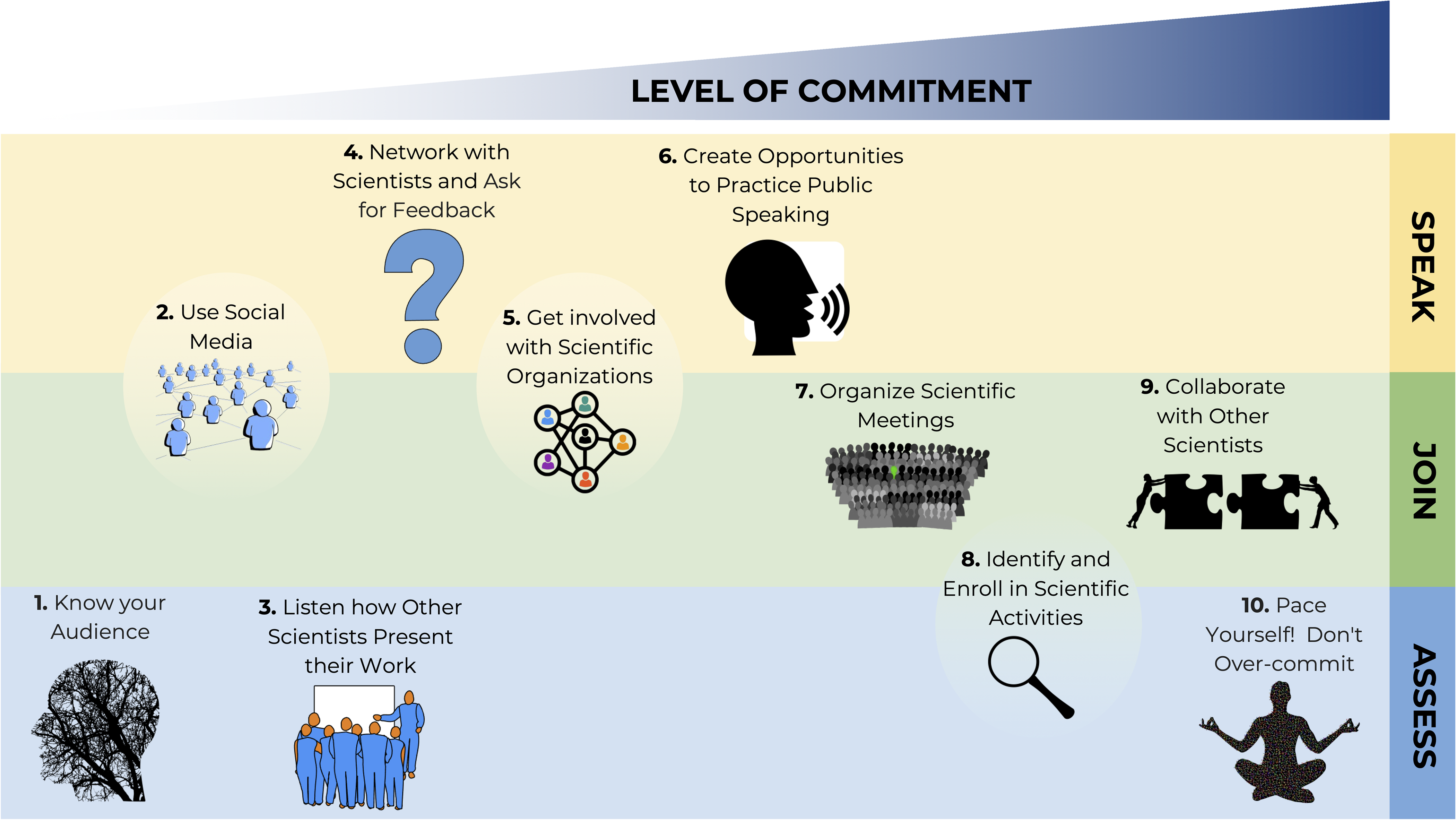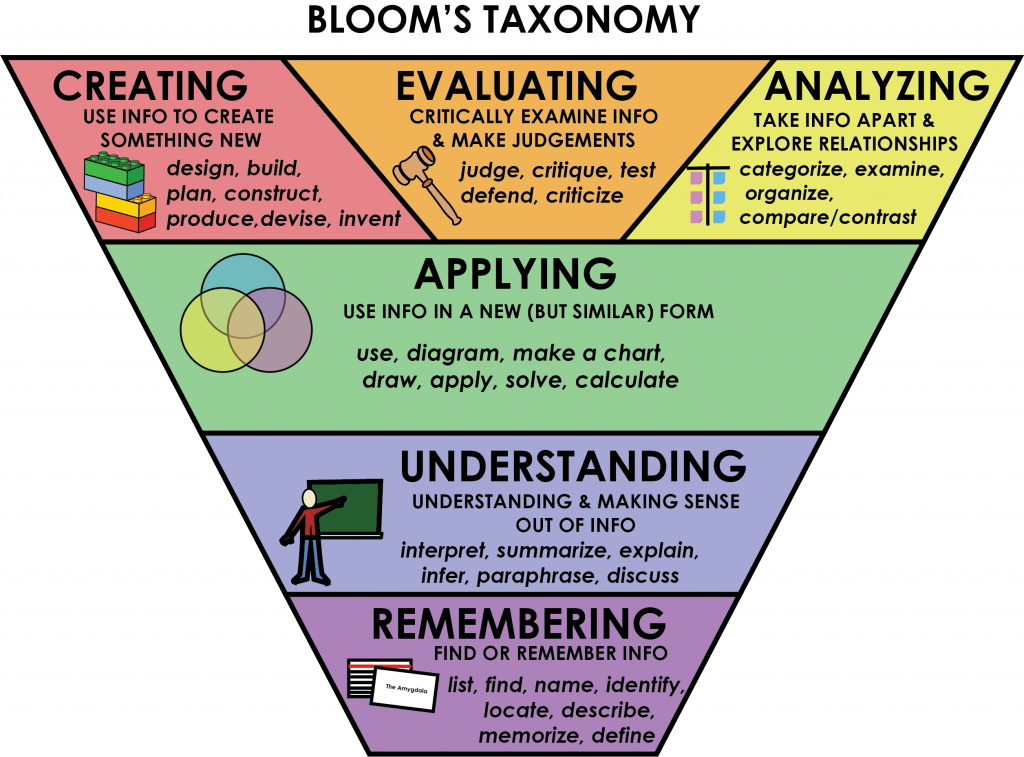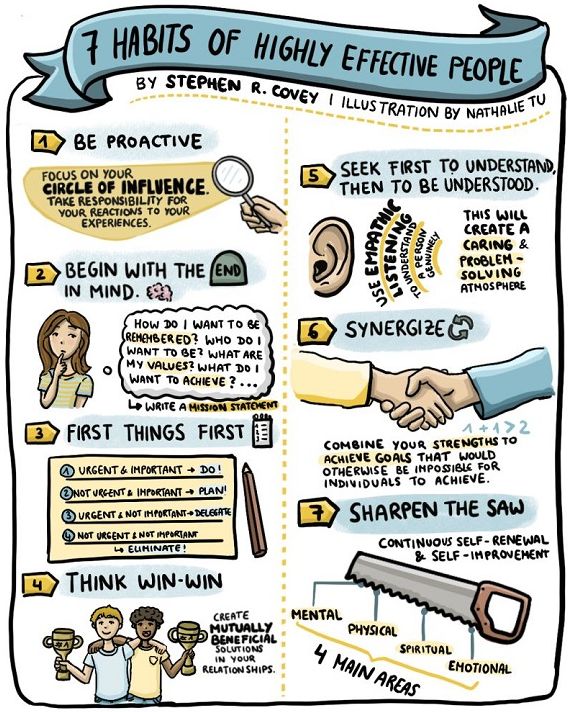Publication Resources
Communication is a critical element of all scientific careers. There are many ways to understand (assess), participate (join), and let others know (speak) about the innovations you create. Ten simple rules for improving communication among scientists1 is a guide to improve communication at different stages of your career.

The lowest level of engagement is to know your audience and a great place to start. Higher levels of engagement are for organizational sponsors who drive innovation across the discipline. This is similar to achieving higher levels of learning (see Bloom's Taxonomy figure by Rawia Inaim, Kwantlen Polytechnic University) by evaluating and analyzing to create new communication channels.

Communication is an important topic that is discussed in this course. Assess your own personal progress and create a plan to build your own level of commitment for communication.
Publish Preprints
What can I archive and what must I not archive in a publicly accessible place?
SHERPA/Romeo Guidelines for >2,000 journals http://www.sherpa.ac.uk/romeo/index.php
Good instructions for using SHERPA/Romeo http://info.hsls.pitt.edu/updatereport/?p=5560
Open access. It varies by publisher, and what you paid for. Web sites for Elsevier, Wiley, Springer, others. Look first. https://opensource.com/resources/what-open-access
Can I archive in the BYU library?
Yes. https://scholarsarchive.byu.edu/ Since this is a non-profit institution site, you can post somethings here that you cannot post on a public site (like Research Gate). Set up an account. Check SHERPA/Romeo to see what you can post. The librarians can also help you figure out what is legal to post, but I have found that they are more anxious to get stuff posted, so they overextend beyond copyright laws. Perhaps they are better at this in recent years, compared to when the site first opened.
Where can I publish big data sets, codes, and other things that are related to my research and student theses and dissertations?
BYU’s https://scholarsarchive.byu.edu/ allows you to archive big data here.
Grad students (and faculty) need to be aware of predatory journals (OMICS and others) https://www.consumer.ftc.gov/blog/2016/08/academics-and-scientists-beware-predatory-journal-publishers and http://thinkchecksubmit.org/check/ and https://doaj.org/bestpractice
Publications and Thesis / Dissertation
LaTeX is software for document preparation where the source is compiled to a PDF. Overleaf is a web-based service to assist with document collaboration. LaTeX facilitates the formatting of the document for technical publications so that more focus is spent on the content instead of the layout. BYU Chemical Engineering graduate students must follow the college thesis/dissertation formatting guidelines.
Integrity in Authorship
Who should be included in an author list on a peer-reviewed publication? The biomedical field has made the following guidelines. The NIH is enforcing this on research from NIH and PHS funds. (Other fields may have their own guidelines.) http://www.icmje.org/recommendations/
- Substantial contributions to the conception or design of the work; or the acquisition, analysis, or interpretation of data for the work; AND
- Drafting the work or revising it critically for important intellectual content; AND
- Final approval of the version to be published; AND
- Agreement to be accountable for all aspects of the work in ensuring that questions related to the accuracy or integrity of any part of the work are appropriately investigated and resolved.
Focus on Communication
Communication (writing, presenting, emailing, posting) can be challenging but is an essential part of technical work. Stephen R. Covey (illustration by Nathalie Tu) discussed 7 habits of highly effective people. Habit 3 is putting first things first. Writing a technical paper or finishing a thesis is an important task that should be scheduled. Seek ways to collaborate such as exchange drafts with a fellow graduate student or hold a writing hour each day.

References
- Bautista, C., Alfuraiji, N., Drangowska-Way, A., Gangwani, K., de Flamingh, A. and Bourne, P.E., 2022. Ten simple rules for improving communication among scientists. PLOS Computational Biology, 18(6), p.e1010130. Article